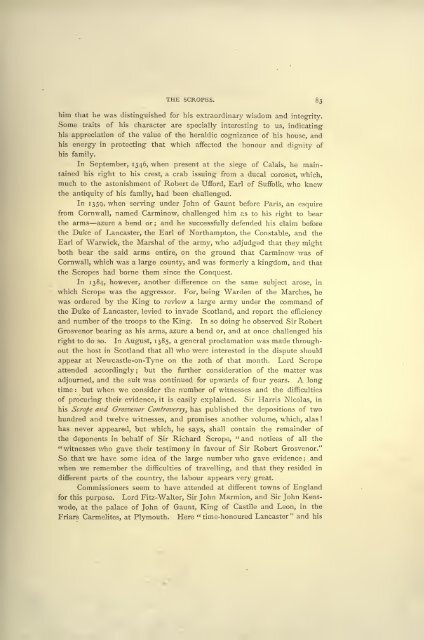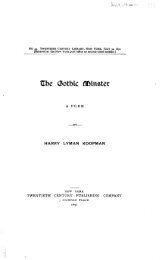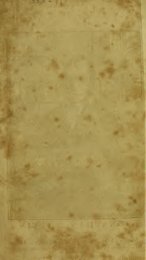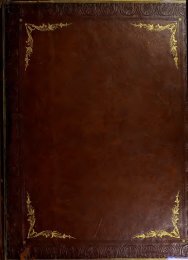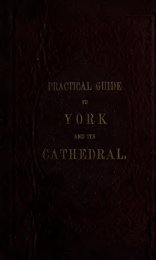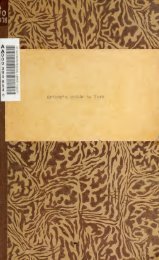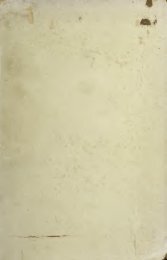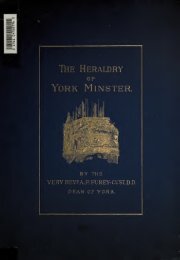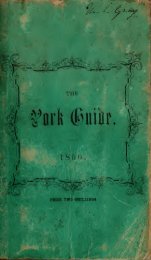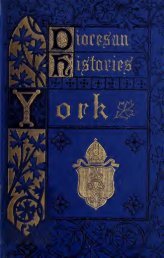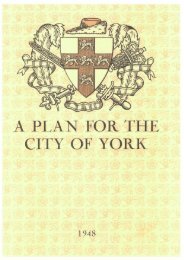- Page 1:
HE HERALDRY OF YORK MINSTER BY THE
- Page 5:
Cbe Tberalfcrv of lj)orfc fllMnster
- Page 9 and 10:
THE HERALDRY OF /HMneter: A KEY TO
- Page 11 and 12:
TO H.R.H. PRINCE ALBERT VICTOR OF W
- Page 13:
TO H.R.H. PRINCE ALBERT VICTOR OF W
- Page 16 and 17:
viii. PREFACE. with which this volu
- Page 18 and 19:
X. TABLE OF CONTENTS. THE FESS 2 47
- Page 20 and 21:
xii. LIST OF COLOURED ILLUSTRATIONS
- Page 23 and 24:
THE HERALDRY OF YORK MINSTER. INTRO
- Page 25 and 26:
INTRODUCTION. The arms of Willoughb
- Page 27 and 28:
INTRODUCTION. 25 " rude and stormy
- Page 29 and 30:
Tennyson INTRODUCTION. 27 one of En
- Page 31 and 32:
INTRODUCTION. 29 inanimate, which w
- Page 33 and 34:
INTRODUCTION. 31 engraved on an ena
- Page 35 and 36: INTRODUCTION. 33 1317. nth of Ed. I
- Page 37 and 38: INTRODUCTION. 35 " the horns of gia
- Page 39 and 40: INTRODUCTION. 37 " Loose in the win
- Page 41 and 42: INTRODUCTION. 39 down, but seemed t
- Page 43 and 44: INTRODUCTION. 4 ! chapter of the co
- Page 45 and 46: INTRODUCTION. 43 " who saluted me g
- Page 47 and 48: INTRODUCTION. 45 " To him that disc
- Page 49 and 50: INTRODUCTION. 47 That it had become
- Page 51 and 52: INTRODUCTION. 49 The effort was, ho
- Page 53 and 54: INTRODUCTION. 5 1 And lastly, Edmun
- Page 55 and 56: INTRODUCTION. 33 1 ' A vesture Woic
- Page 57 and 58: INTRODUCTION. 55 The ostrich plume
- Page 59 and 60: INTRODUCTION. 57 brown in summer, i
- Page 61 and 62: INTRODUCTION. 59 or lambskin should
- Page 63 and 64: INTRODUCTION. 6 1 The Chevaliers de
- Page 65 and 66: INTRODUCTION. 63 feeling sure that
- Page 67 and 68: INTRODUCTION. when they heard the t
- Page 69 and 70: INTRODUCTION. link of the chain-arm
- Page 71 and 72: INTRODUCTION. 6 9 In royal armoury,
- Page 73 and 74: INTRODUCTION. 7 1 The attendant arm
- Page 75 and 76: INTRODUCTION. 73 each side of the a
- Page 77 and 78: INTRODUCTION. 75 Margaret Savage se
- Page 79 and 80: INTRODUCTION. 77 was the fate of th
- Page 81 and 82: THE BEND. AVING now considered the
- Page 83 and 84: THE BEND. 8 I shoulder. Planche als
- Page 85: PLATE i. SCROPE OF BOLTON. SCROPE A
- Page 89 and 90: THE SCROPES. 85 speak of Sir Robert
- Page 91 and 92: THE SCROPES. 87 prisonment of the u
- Page 93 and 94: THE SCROPES. 89 rector of Ainderby
- Page 95 and 96: THE SCROPES. 91 having been kept un
- Page 97 and 98: THE SCROPES. 93 Life was lightly va
- Page 99 and 100: THE SCROPES. 95 Choir windows. The
- Page 101 and 102: THE SCROPES. 97 Richard, Earl of Ca
- Page 104 and 105: oftfmsivn. S- Wilfrid. STOME SHIELD
- Page 106 and 107: 100 THE HERALDRY OF YORK MINSTER. s
- Page 109 and 110: THE SCROPES. IOI "in 1387 had nomin
- Page 111 and 112: THE SCROPES. 103 official " of our
- Page 113: PLATE 2. w^^.. BEK OR GANT. TREHOUS
- Page 116 and 117: 106 THE HERALDRY OF YORK MINSTER. I
- Page 118 and 119: 108 THE HERALDRY OF YORK MINSTER. S
- Page 120 and 121: HO THE HERALDRY OF YORK MINSTER. Tu
- Page 122 and 123: 112 THE HERALDRY OF YORK MINSTER. T
- Page 124 and 125: I 1 4 THE HERALDRY OF YORK MINSTER.
- Page 126 and 127: Il6 THE HERALDRY OF YORK MINSTER. I
- Page 128 and 129: Il8 THE HERALDRY OF YORK. MINSTER.
- Page 130 and 131: 120 THE HERALDRY OF YORK MINSTER. t
- Page 132 and 133: 122 THE HERALDRY OF YORK MINSTER. "
- Page 134 and 135: 124. THE HERALDRY OF YORK MINSTER.
- Page 136 and 137:
126 THE HERALDRY OF YORK MINSTER. "
- Page 138 and 139:
128 THE HERALDRY OF YORK MINSTER. w
- Page 140 and 141:
130 THE HERALDRY OF YORK MINSTER. a
- Page 143 and 144:
HASTINGS. 131 assumed, not, as Mr.
- Page 145 and 146:
HASTINGS. 133 But the stout old kni
- Page 147 and 148:
THE EURES. 135 According to the ped
- Page 149 and 150:
THE EURES. 137 In Old Yorkshire, vo
- Page 151 and 152:
THE EURES. 139 She speaks of hersel
- Page 153 and 154:
The Eures appear to THE EURES. 141
- Page 155 and 156:
THE EURES. 143 Sir Thomas Carlton,
- Page 157 and 158:
THE EURES. 145 To avenge this, a se
- Page 159 and 160:
THE EURES. 147 and the Emperor rath
- Page 161 and 162:
THE EURES. 149 walls of the castle.
- Page 163 and 164:
THE EURES. 151 By the advice of thi
- Page 165 and 166:
THE EURES. 153 When James VI. of Sc
- Page 167 and 168:
THE EURES. 155 In it Sir Francis Eu
- Page 169 and 170:
THE EURES. 157 By her he had one so
- Page 171 and 172:
THE EURES. 159 " Army," directing h
- Page 173 and 174:
THE EURES. l6l on one side, who can
- Page 175 and 176:
THE CONSTABLES. 163 1666. Mary Palm
- Page 177 and 178:
THE CONSTABLES. 165 judgment, " on
- Page 179 and 180:
THE CONSTABLES. 167 Church ; the dr
- Page 182 and 183:
PLATE 4. L u TE R N I V A L. WA LW
- Page 184 and 185:
I yo THE HERALDRY OF YORK MINSTER.
- Page 186 and 187:
IT 2 THE HERALDRY OF YORK MINSTER.
- Page 188 and 189:
174 THE HERALDRY OF YORK MINSTER. W
- Page 190 and 191:
176 THE HERALDRY OF YORK MINSTER. a
- Page 192 and 193:
' 178 THE HERALDRY OF YORK MINSTER.
- Page 194 and 195:
180 THE HERALDRY OF YORK MINSTER. "
- Page 196 and 197:
1 82 THE HERALDRY OF YORK MINSTER.
- Page 198 and 199:
184 THE HERALDRY OF YORK MINSTER. T
- Page 200 and 201:
1 86 THE HERALDRY OF YORK MINSTER.
- Page 202 and 203:
lS8 THE HERALDRY OF YORK MINSTER. l
- Page 204 and 205:
190 THE HERALDRY OF YORK MINSTER. W
- Page 206 and 207:
1Q2 THE HERALDRY OF YORK MINSTER. t
- Page 208 and 209:
194 THE HERALDRY OF YORK MINSTER. "
- Page 210 and 211:
I 9 6 THE HERALDRY OF YORK MINSTER.
- Page 212 and 213:
198 THE HERALDRY OF YORK MINSTER. o
- Page 214 and 215:
200 HERALDRY OF YORK MINSTER. WALLE
- Page 216 and 217:
2O2 THE HERALDRY OF YORK MINSTER. T
- Page 218 and 219:
204 THE HERALDRY OF YORK MINSTER. S
- Page 220 and 221:
206 . THE HERALDRY OF YORK MINSTER.
- Page 222 and 223:
208 THE HERALDRY OF YORK MINSTER. T
- Page 224 and 225:
210 THE HERALDRY OF YORK MINSTER. R
- Page 226 and 227:
212 THE HERALDRY OF YORK MINSTER. a
- Page 228 and 229:
214 THE HERALDRY OF YORK MINSTER. T
- Page 230 and 231:
2l6 THE HERALDRY OF YORK MINSTER. B
- Page 232 and 233:
2l8 THE HERALDRY OK YORK MINSTER. o
- Page 234 and 235:
220 THE HERALDRY OF YORK MINSTER. T
- Page 236 and 237:
222 THE HERALDRY OF YORK MINSTER. H
- Page 238 and 239:
224 THE HERALDRY OF YORK MINSTER. o
- Page 240 and 241:
226 THE HERALDRY OF YORK MINSTER. t
- Page 242 and 243:
228 THE HERALDRY OF YORK MINSTER. C
- Page 244 and 245:
230 THE HERALDRY OF YORK MINSTER. h
- Page 246 and 247:
232 THE HERALDRY OF YORK MINSTER. T
- Page 248 and 249:
234 THE HERALDRY OF YORK MINSTER. n
- Page 250 and 251:
236 THE HERALDRY OF YORK MINSTER. T
- Page 253 and 254:
his THE STAFFORDS. 237 son Ralph, V
- Page 255 and 256:
THE STAFFORDS. 239 In the following
- Page 257 and 258:
THE STAFFORDS. 241 Dugdale says (Ba
- Page 259 and 260:
THE STAFFORDS. 243 Atkyns, in his "
- Page 261 and 262:
THE STAFFORDS. 245 His remark "more
- Page 263 and 264:
THE FESS. THE next Heraldic charge
- Page 265 and 266:
THE FESS. 249 sometimes of leather
- Page 267 and 268:
THE CLIFFORDS. 251 broker's shop ar
- Page 269 and 270:
THE CLIFFORDS. 253 " inconvenience
- Page 271 and 272:
THE CLIFFORDS. 255 post, however (a
- Page 273 and 274:
THE CLIFFORDS. 257 In the fifteenth
- Page 275 and 276:
THE CLIFFORDS. 259 The western, or
- Page 277 and 278:
THE CLIFFORDS. 261 In the "great we
- Page 279 and 280:
THE CLIFFORDS. 263 " garters, roses
- Page 281 and 282:
THE CLIFFORDS. 265 His daughter is
- Page 283 and 284:
THE CLIFFORDS. 267 Thither Richard,
- Page 285 and 286:
THE CLIFFORDS. 269 "Wast thou ordai
- Page 287 and 288:
THE CLIFFORDS. 271 "Our Clifford wa
- Page 289 and 290:
THE CLIFFORDS. 273 His son Henry, w
- Page 291 and 292:
THE CLIFFORDS. 275 lifetime also he
- Page 293 and 294:
THE CLIFFORDS. 277 So cruel Sussex
- Page 295 and 296:
THE CLIFFORDS. 279 " your very harb
- Page 297 and 298:
THE CLIFFORDS. 281 There is little
- Page 299 and 300:
THE WARRENNES. 283 to it. twenty-ei
- Page 301 and 302:
THE WARRENNES. 285 He was buried wi
- Page 303 and 304:
THE WARRENNES. 287 he was again act
- Page 305 and 306:
THE WARRENNES. 289 " Conisburgh, an
- Page 307 and 308:
THE WARRENNES. 291 his measures. Wa
- Page 309 and 310:
THE WARRENNES. 293 large, of great
- Page 311 and 312:
THE WARRENNES. 295 Then came a quar
- Page 313 and 314:
THE WAKES. 297 iron yoke many who f
- Page 315 and 316:
THE WAKES. 299 de Chaworth, Lord of
- Page 317 and 318:
THE WAKES. 301 these circumstances,
- Page 319 and 320:
THE WAKES. 303 He married Alice Fit
- Page 321 and 322:
de Clare, THE HILTONS. 305 William
- Page 323 and 324:
THE HILTONS. 307 The sequel is easi
- Page 326 and 327:
PLATE 6. FITZ ALAN. VALENCE. Publis
- Page 328 and 329:
310 HERALDRY OF YORK MINSTER. His g
- Page 330 and 331:
312 THE HERALDRY OF YORK MINSTER. p
- Page 332 and 333:
314 THE HERALDRY OF YORK MINSTER. s
- Page 334 and 335:
3 1 6 THE HERALDRY OF YORK MINSTER.
- Page 336 and 337:
318 THE HERALDRY OF YORK MINSTER. "
- Page 338 and 339:
320 THE HERALDRY OF YORK MINSTER. i
- Page 340 and 341:
322 THE HERALDRY OF YORK MINSTER. t
- Page 342 and 343:
324 THE HERALDRY OF YORK MINSTER. s
- Page 344 and 345:
326 THE HERALDRY OF YORK MINSTER. m
- Page 346 and 347:
328 THE HERALDRY OF YORK MINSTER. t
- Page 348 and 349:
330 THE HERALDRY OF YORK MINSTER. b
- Page 350 and 351:
332 THE HERALDRY OF YORK MINSTER. I
- Page 352 and 353:
334 THE HERALDRY OF YORK MINSTER. T
- Page 354 and 355:
336 THE HERALDRY OF YORK MINSTER. H
- Page 356 and 357:
338 THE HERALDRY OF YORK MINSTER. "
- Page 358 and 359:
340 THE HERALDRY OF YORK MINSTER. t
- Page 360 and 361:
342 THE HERALDRY OF YORK MINSTER. T
- Page 362 and 363:
344 THE HKRALDRY OF YORK MINSTER. "
- Page 364:
346 THE HERALDRY OF YORK MINSTER. o
- Page 367 and 368:
ROYAL HERALDRY. The ROYAL HERALDRY
- Page 370 and 371:
GREAT SEAL OF X/CHARD 2 D GREAT SEA
- Page 372 and 373:
"In 35 THE HERALDRY OF YORK MINSTER
- Page 375 and 376:
ROYAL HERALDRY. 351 I may add here
- Page 377 and 378:
ROYAL HERALDRY. 353 eventually the
- Page 379 and 380:
ROYAL HERALDRY. 357 made. "By holy
- Page 381 and 382:
ROYAL HERALDRY. 350 entirely new sy
- Page 383 and 384:
ROYAL HERALDRY. 361 Geoffrey le Scr
- Page 385 and 386:
ROYAL HERALDRY. 363 Wales and Scotl
- Page 387 and 388:
ROYAL HERALDRY. 365. Claude Frankel
- Page 389 and 390:
ROYAL HERALDRY. 367 to proclaim " L
- Page 391 and 392:
ROYAL HERALDRY. 369 On St. George's
- Page 394 and 395:
PLATE a. I/A i EMPEROR or GERMANY.
- Page 396 and 397:
372 THE HERALDRY OF YORK MINSTER. o
- Page 398 and 399:
374 THE HERALDRY OF YORK MINSTER. t
- Page 400 and 401:
376 THE HERALDRY OF YORK MINSTER. a
- Page 402 and 403:
378 THE HERALDRY OF YORK MINSTER. B
- Page 404 and 405:
380 THE HERALDRY OF YORK MINSTER. a
- Page 406 and 407:
382 THE HERALDRY OF YORK MINSTER. i
- Page 408 and 409:
384 THE HERALDRY OF YORK MINSTER. w
- Page 410:
386 THE HERALDRY OF YORK MINSTER. p
- Page 413 and 414:
ROYAL HERALDRY. 387 His three broth
- Page 415 and 416:
ROYAL HERALDRY. 389 When, therefore
- Page 417 and 418:
, building, ROYAL HERALDRY. 391 par
- Page 419 and 420:
ROYAL HERALDRY. 393 great indignati
- Page 421 and 422:
ROYAL HERALDRY. to 1,000, were assi
- Page 423 and 424:
ROYAL HERALDRY. 39- In 1328, howeve
- Page 426 and 427:
PLATE w. IV. v. CARDINAL BEAUFORT.
- Page 428 and 429:
400 THE HERALDRY OF YORK MINSTER. w
- Page 430 and 431:
402 THE HERALDRY OF YORK MINSTER. i
- Page 433 and 434:
GENERAL INDEX. Abergavenny, Baron,
- Page 435 and 436:
GENERAL INDEX. 407 John, King of En
- Page 437 and 438:
HERALDIC INDEX. 409- Alan, 311 Anjo
- Page 439 and 440:
LIST OF SUBSCRIBERS. 4IF Farrer, J.
- Page 443:
CR Gust, Arthur Perceval 1619 Purey


